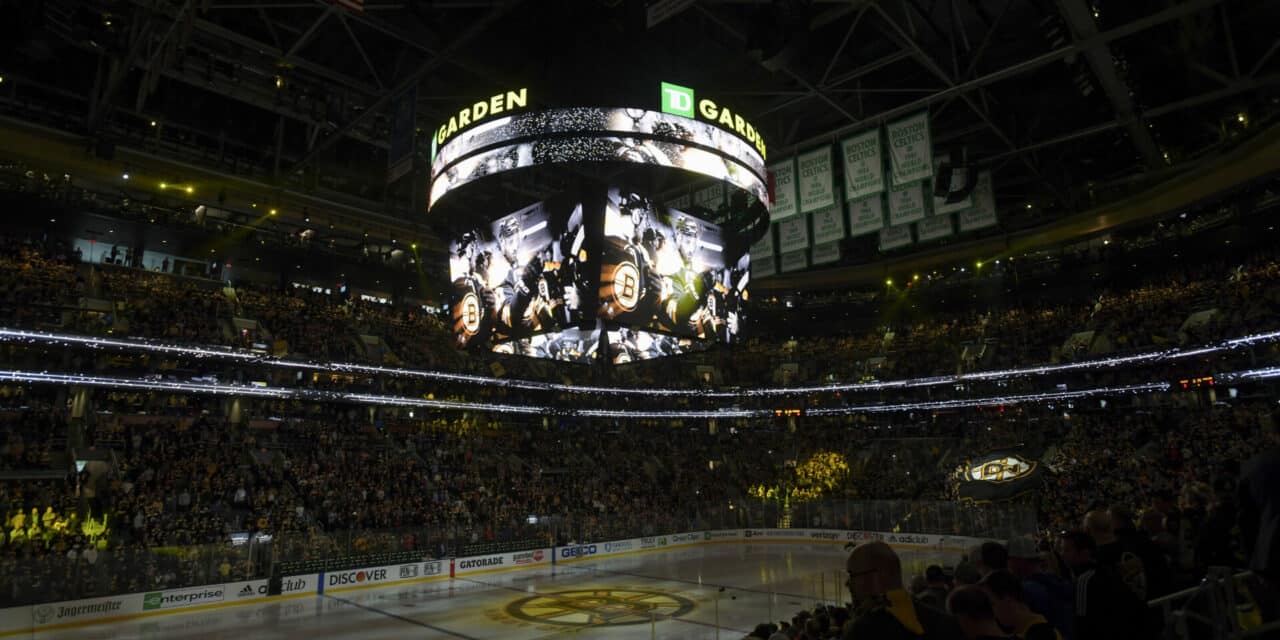Just Cause: Recent upgrades to TD Garden totaling $200 million have seen 50,000 square feet of space added at all levels of the arena, providing more room for food and beverage as well as premium spaces. (Bret Osswald)
TD Garden Anchors A Hub Of Boston Live Entertainment
TD Garden and The Hub on Causeway is Boston’s burgeoning sports and entertainment oasis, a district where fans can live, work and watch the Celtics or Bruins play.
“Our parent company, Delaware North, and the Jacobs Family have remained committed to keeping TD Garden as a best-in-class arena,” said Amy Latimer, president of TD Garden and chief development officer for Delaware North. “That continued investment is the primary driver of keeping TD Garden front and center in a crowded market.”
The creation of The Hub on Causeway mixed-use development and the recent expansion of TD Garden has turned the area into a year-round destination. Anchored by the 19,600-capacity TD Garden arena, Hub Hall provides a variety of local food and beverage options for office workers and post-show crowds including Banners Kitchen and Tap, which along with Hub Hall are operated by Delaware North’s Patina Restaurant Group.
“We are consistently looking for ways to improve the guest experience and talent experience,” said Latimer, who was named the 2022-23 executive in residence for the University of Massachusetts Boston Sports Leadership and Administration Program. “While we can’t control the outcome of a game or a concert, we can control the guest experience and journey to make sure people have a good time and want to return to TD Garden.”
She said they accomplished that goal by expanding the TD Garden by 50,000 square feet on all levels, providing more communal gathering spaces, more food and beverage options and premium hospitality spaces.

TD Garden also refurbished back-of-house. “For artists and other talent, we took this past offseason to improve our back-of-house functionalities with renovations to the performer rooms, locker rooms, press room, family lounges, crew shower rooms and more.
“We hope this makes a positive, lasting impression on visiting tours and makes them feel at home when they’re here in Boston,” she said.
Originally opened in 1995 and renovated in 2014 for $70 million, the current incarnation of TD Garden was a city-wide endeavor.
See Also:
Boston Market Focus Venues In Play
Boston Market Focus Artist Take With Ken Casey Of Dropkick Murphys
“At the very beginning (of the pandemic), we certainly had our fair share of starts and stops,” Latimer recalled. “We had worked closely with city, state and public health officials on our Play It Safe program to ensure we were providing guests with the most updated information, guidelines and precautions. The good news is that things from a business perspective are back on track, and we’ve all learned how to pivot should the need arise again.”
TD Garden had a strong postseason run last season with both the Bruins and Celtics, who made it to the NBA Finals, which helped business lines exceed expectations. Most recently for concerts, TD Garden placed in the Top 10 for paid tickets and gross ticket sales per Pollstar’s 2022 Q3 Worldwide Top 200 Arenas Chart.
“We have a community that is excited about the return of live events and they’re showing up as passionate as ever,” Latimer said.
The fall lineup is packed with concerts and the return of hockey and hoops. Latimer said the Jacobs family and Jeremy Jacobs Sr., Bruins owner and chairman of Delaware North, have a steadfast commitment to keeping TD Garden front-and-center in a crowded market. Attendance at TD Garden has been at an all-time high, and Latimer credits that to the expansion and renovations within the arena. During the transformation they re-branded The Premium Club — now known as Boston Garden Society — and created one of the industry’s first subscription-based membership programs in Rafters (TD Garden’s newest level of entertainment). DNC added chef-inspired, made-to-order food options, curated cocktails and crafted spirits to their menus throughout the arena. A cornerstone of the development is The Hub on Causeway, a$1 billion mixed-use project that was two decades in the making.
The first two phases opened in early 2020 with an underground pedestrian tunnel to North Station, a luxury apartment building, hotel, live music venue, two restaurants and downtown Boston’s largest grocery store.
In 2021, the third and final phase of The Hub on Causeway opened with a 31-story office tower, which is now home to Verizon, security tech firm Rapid7 and corporate offices for the Bruins and Celtics.
“The Hub on Causeway has been a great addition to the area, giving the community a place to live, work and play,” Latimer said. “We’ve definitely seen increased foot traffic to the area overall given the uptick in TD Garden events and new amenities and offerings on non-event nights throughout The Hub.” Some of those new offerings include the 2,000-capacity upscale club and concert venue called Big Night Live, which hosts touring artists.
Prior to development, Bulfinch Triangle was a place many Bostonians passed through – commuters, tourists, fans coming and going to concerts and games — but didn’t stay.
“With The Hub on Causeway, it is no longer a place to pass through,” Latimer said. “It’s now become an exciting, standalone destination. The new entertainment destination has rejuvenated and re-energized this part of town. “It has truly been a game changer for the neighborhood, commuters and all our associates.”
A fixture in the market for about 30 years, Latimer sees the future of TD Garden this way:
“Historic and here to stay. There is just nothing like the feeling of being inside TD Garden, the home of two historic NHL and NBA franchises with the most championship banners hanging in the rafters. You can’t manufacture that kind of history,” she said.
Venues Solidify Market Position As New Players, Buildings Come Online
By Ryan Borba
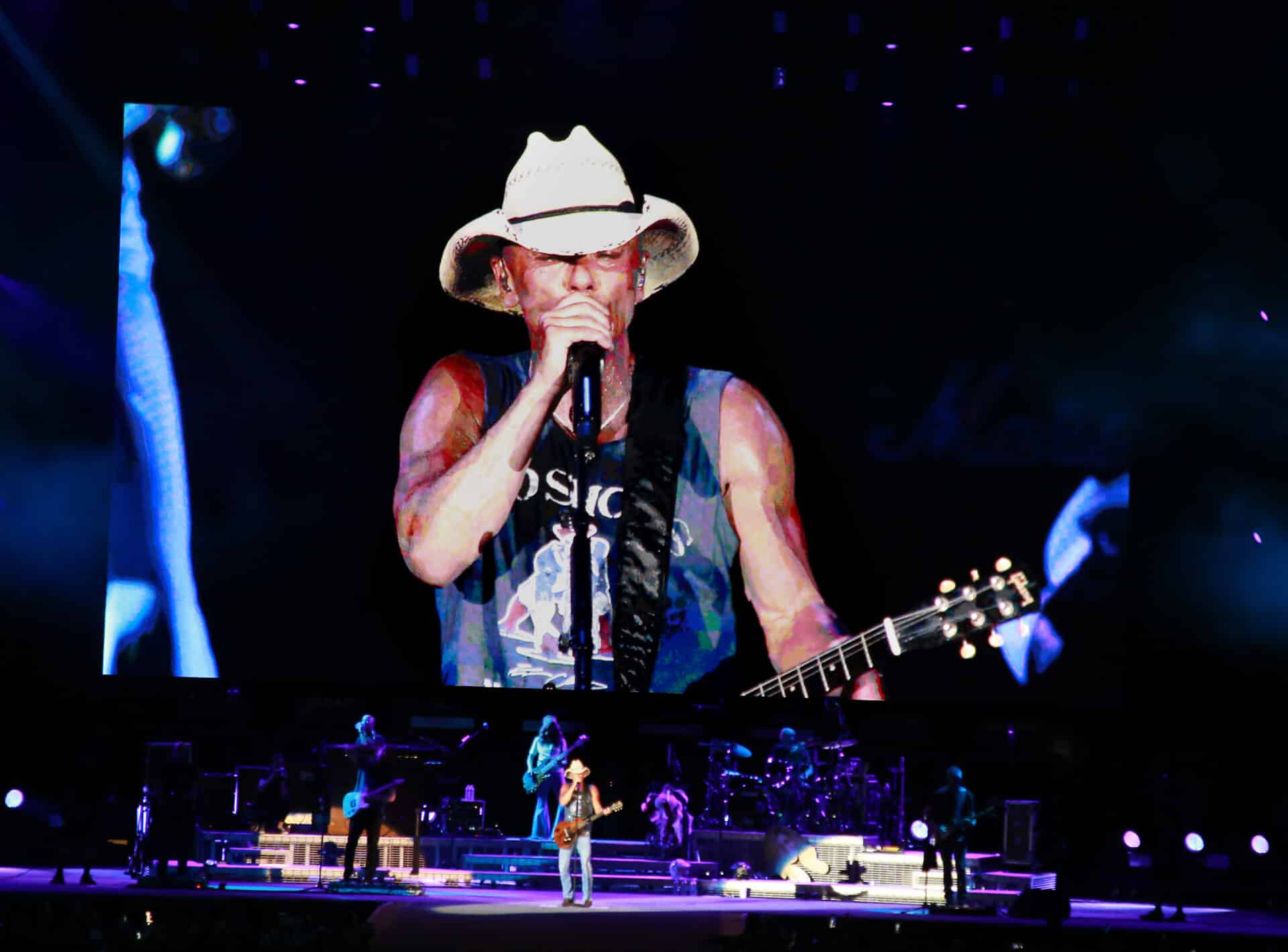
21 And Over: Kenny Chesney, pictured at Gillette Stadium in 2018, this year played his 20th and 21st shows at the stadium, which have sold more than 1 million tickets cumulatively. (Getty Images)
Despite multiple new venues opening over the past few years and major development and renovation among existing facilities, the mood among building managers in the market seems to be one of excitement rather than resentment among competitors.
“It’s definitely competition, but we’re always up for a little competition,” said Kristoffer Brassil, general manager of the 8,000-capacity Agganis Arena on the campus of Boston University. Brassil notes the recent openings of Bowery Presents’ Roadrunner Boston “right down the street,” an indoor 3,500-capacity venue, as well as the new MGM Fenway Music Hall “that has been very active in the month or so they’ve been open.”
That doesn’t mean business has slowed down for anyone.
“Concerts have been a strength. Obviously there’s been pent-up demand and with additional venues, as well as venues that have been around forever doing more content,” Brassil said, noting Fenway Park and Gillette Stadium hosting more concerts than usual.
Agganis Arena’s primary tenant is BU men’s hockey, which is entering its 101st season overall. It’s one example of the arena being part of more than just a show calendar and ticket sales generator.
“It’s coming up on 18 years old and looks the same as the day it opened,” Brassil said of Agganis Arena, noting that the venue gets a fresh coat of paint every year and is in the process of replacing all of its seats. “The guests appreciate when the venue is clean, well lit and freshly painted more than if you let that stuff slide.”
Brassil said recent highlights have been shows from Latin artists including Daddy Yankee and Rauw Alejandro as well as upcoming dates by Camilo and Puerto Rican duo Wisin & Yandel. He says family shows are strong as well, with parents eager to go out and more children vaccinated against COVID.
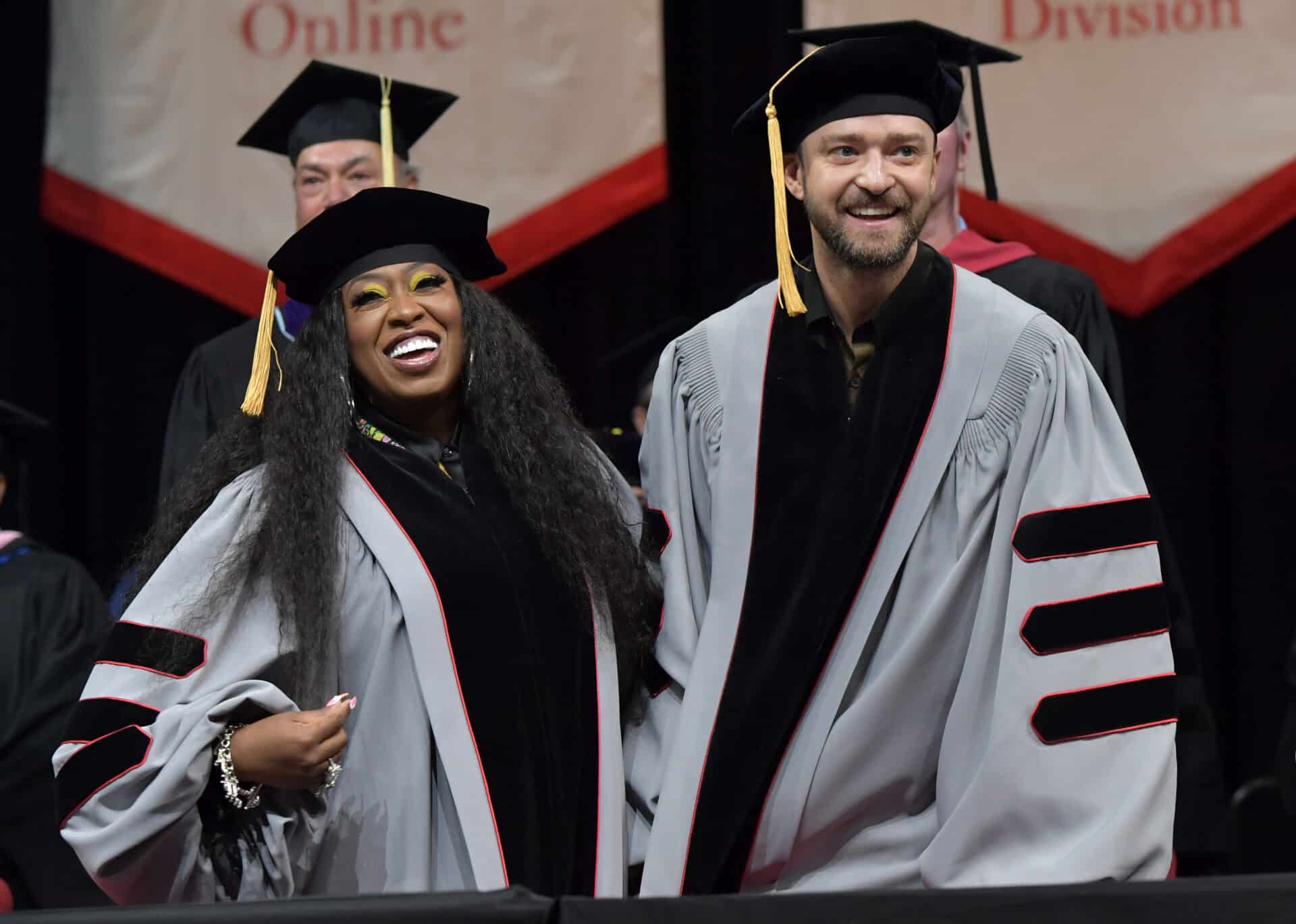
Honorary Degrees: Agganis Arena is the traditional host of the Berklee College of Music commencement ceremony, which includes musical performances. The 2019 ceremonies included degrees given to Missy Elliott and Justin Timberlake. (Getty Images)
BOSTON, MA – MAY 11: Missy Elliott and Justin Timberlake attend the Berklee College of Music 2019 Commencement ceremony at Agganis Arena at Boston University on May 11, 2019 in Boston, Massachusetts. More than 1,100 students graduated in all and receiving honorary degrees were Missy Elliott, Justin Timberlake and Alex Lacamoire. (Photo by Paul Marotta/Getty Images for Berklee)
In 2021, “They say you can’t just flip the switch, but that’s what we did,” he said, with the venue going from at one point being storage for students’ belongings to hosting full-capacity concerts and sporting events again.
“Our results in that fiscal year were pretty much the same as they were before we shut down,” Brassil said.
There’s room for new players in the market, he said, although it can mean losing shows and having to compete more aggressively. It’s overall a good thing for the business and city, he said.
“We’re cognizant that we’ve got to work a little harder to make up for some of the shows that we’re losing down the street,” he said.
“We’re not going anywhere. We know what we’re doing. We’ve got good leadership, we’re all stewards of this amazing university. As long as we keep doing what we’re doing from the service perspective, taking care of the venue and ideally taking care of the guests front and back of house, I feel good about where we’re at.”
Wang Theatre To Become Hall Of Fame
By Wendy Pearl
When Joe Spaulding was traversing the country researching how to create a Hall of Fame for folk music in Boston, he kept hearing the same thing: “Don’t build one.”
It wasn’t that other music museum operators thought the Folk, Americana & Roots Hall of Fame (FARHOF) was a bad idea. It was that Spaulding already had the perfect location — the historic Wang Theatre, a stunning 100-year-old treasure on the National Register of Historic Places.
Spaulding is the CEO of the nonprofit Boch Center, which includes the 3,500-seat Wang Theatre and the smaller, 1,600-capacity Shubert Theatre in the city’s theater district.
Spaulding’s enthusiasm is contagious. He was a folk musician in the 1960s and ‘70s with some success, but found his future achievement on the business side of a microphone. He started an independent record label, was named senior vice president of popular music in the U.S. and Canada for a division of RCA and developed 20,000-seat amphitheaters before being recruited 36 years ago to run the Boch Center. He has since produced more than 7,000 events and performances at the venue.
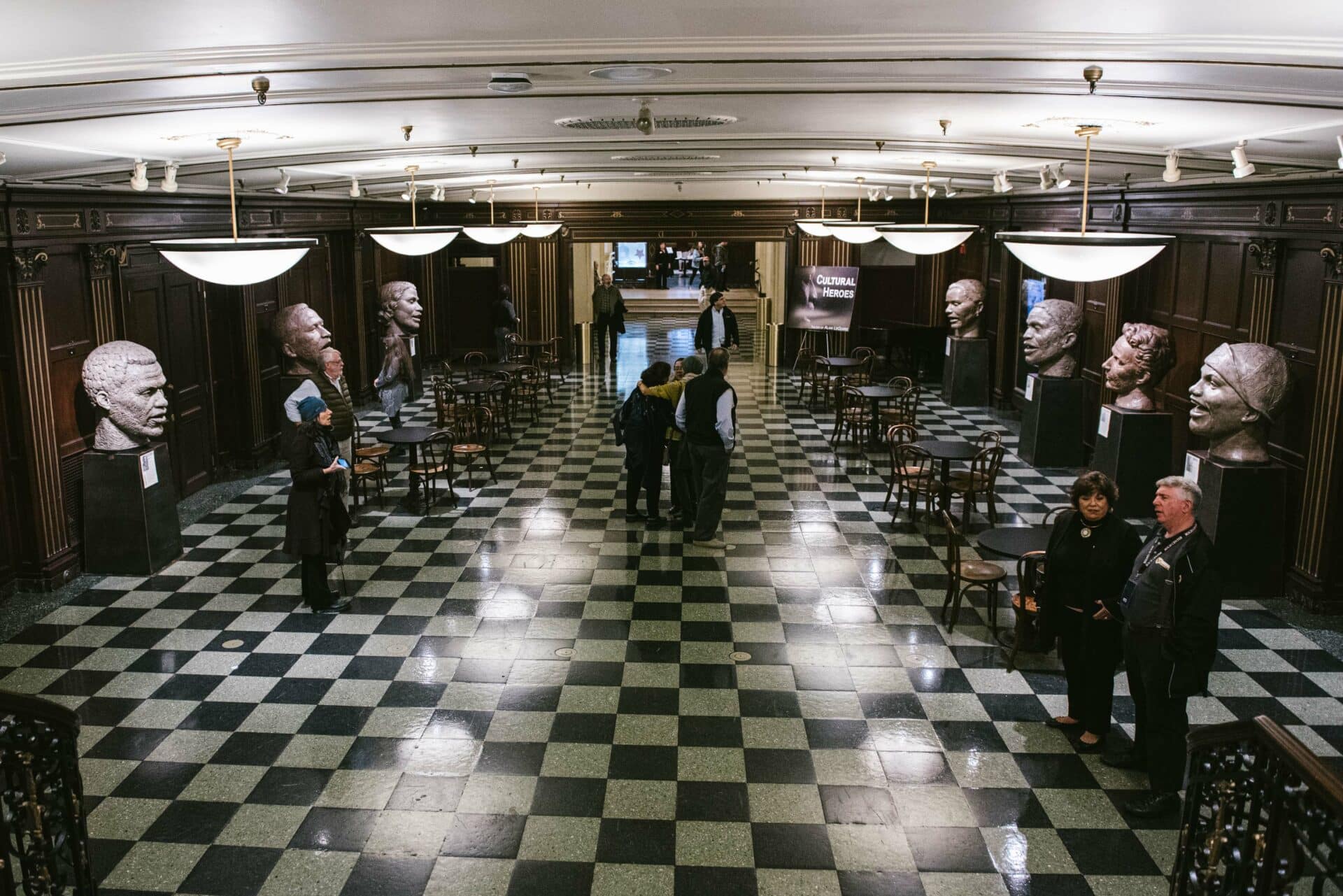
Planting Roots: Wang Theatre at Boch Center is home to the Folk, Americana & Roots Hall of Fame opening in late September. The “Cultural Heroes” installation includes sculptures of Marian Anderson, Paul Robeson, Woody Guthrie, Billie Holiday, Josh White, Lead Belly and Bessie Smith.
“As my career went along, one of my goals was to continue and support the basic theme that we believe in; that the arts keep us a civilized society,” Spaulding said. “Everything we do is centered around that theme.”
Boston has a rich musical lineage. Aerosmith, Joan Baez, The Cars, Tracy Chapman, punk band DMZ, Darlingside, J. Geils Band, Jonathan Richman and the Modern Lovers, Tom Rush, Donna Summer, James Taylor and others had roots in the city. Bob Dylan, the Grateful Dead, Pink Floyd, Bob Marley, Muddy Waters, the Eagles and the Allman Brothers are just a few of the acts to record live at the Wang.
The idea of housing the Folk, American & Roots Hall of Fame in Boston solidified a few years ago during a two-night, sold-out Neil Young concert at the Wang. Spaulding was in the house when Young announced to the audience, “You know, Boston is the folk capital of North America!”
“He said it twice. I thought to myself as I’m sitting there, ‘Gee whiz, there are some legs to this!’ I then began my homework,” Spaulding recalled.
Spaulding researched the Country Music Hall of Fame and Museum in Nashville, the Rock & Roll Hall of Fame and Museum in Cleveland, the Grammy Museum in Mississippi, the Blues Hall of Fame in Memphis and the Bluegrass Hall of Fame in Kentucky. But there wasn’t a formal hall to recognize the influential players in folk, Americana and roots music, the foundation of American music.
“All music comes from that,” Spaulding said. “You evolve as an artist, whether you become a jazz artist, a rock and roll artist, a hip-hop artist, whatever it is, it all starts from that base.”
He said the decision not to build a hall of fame from the ground up saved between $150 million to $200 million and jump-started a fundraising initiative to convert the Wang into a “living, breathing” performing arts center and museum-quality attraction for the city.
Amid COVID shutdowns and layoffs, Spaulding and his team set off on the mission of converting a classic cathedral style theater into a contemporary showcase for the foundation of American music. “We had the chance to do things you don’t normally have the chance to do, because you never want to be dark,” Spaulding said.
During the pandemic, the team launched “The Ghost Light Series,” a collection of streaming live performances in the empty theater that reached 400,000 viewers and raised $300,000. They spent $2.5 million to install an elevator to better access the lower lobby. They conducted tours via Zoom and tapped industry connections for donations of priceless musical artifacts.
“I wanted everything to tell a story, so less is more,” said Spaulding, who has a Lead Belly guitar in his office ready to be displayed in the hall of fame.
Exhibits will be woven throughout the venue and include seven massive busts from Nashville-based sculptor Alan LeQuire, who has contributed work for the Country Music Hall of Fame and Museum. The installation is called “Cultural Heroes” and the pieces on display at the Boston hall include Marian Anderson, Paul Robeson, Woody Guthrie, Billie Holiday, Josh White, Lead Belly and Bessie Smith. Exhibits will rotate and artists performing at the Wang can participate in educational programs and podcasts.
Engaging the artist community is a priority. Honorary chairs on the FARHOF board of directors include Noel “Paul” Stokey of Peter Paul & Mary, Live Nation New England head Don Law, Joan Baez, Keb’ Mo’ and Bob Crawford of the Avett Brothers.
FARHOF is curated by Deana McCloud, founding executive director and chief curator of the Woody Guthrie Center in Tulsa, Oklahoma, and Robert Santelli, former executive director of the Grammy Museum. Both are now partners in Museum Collective.
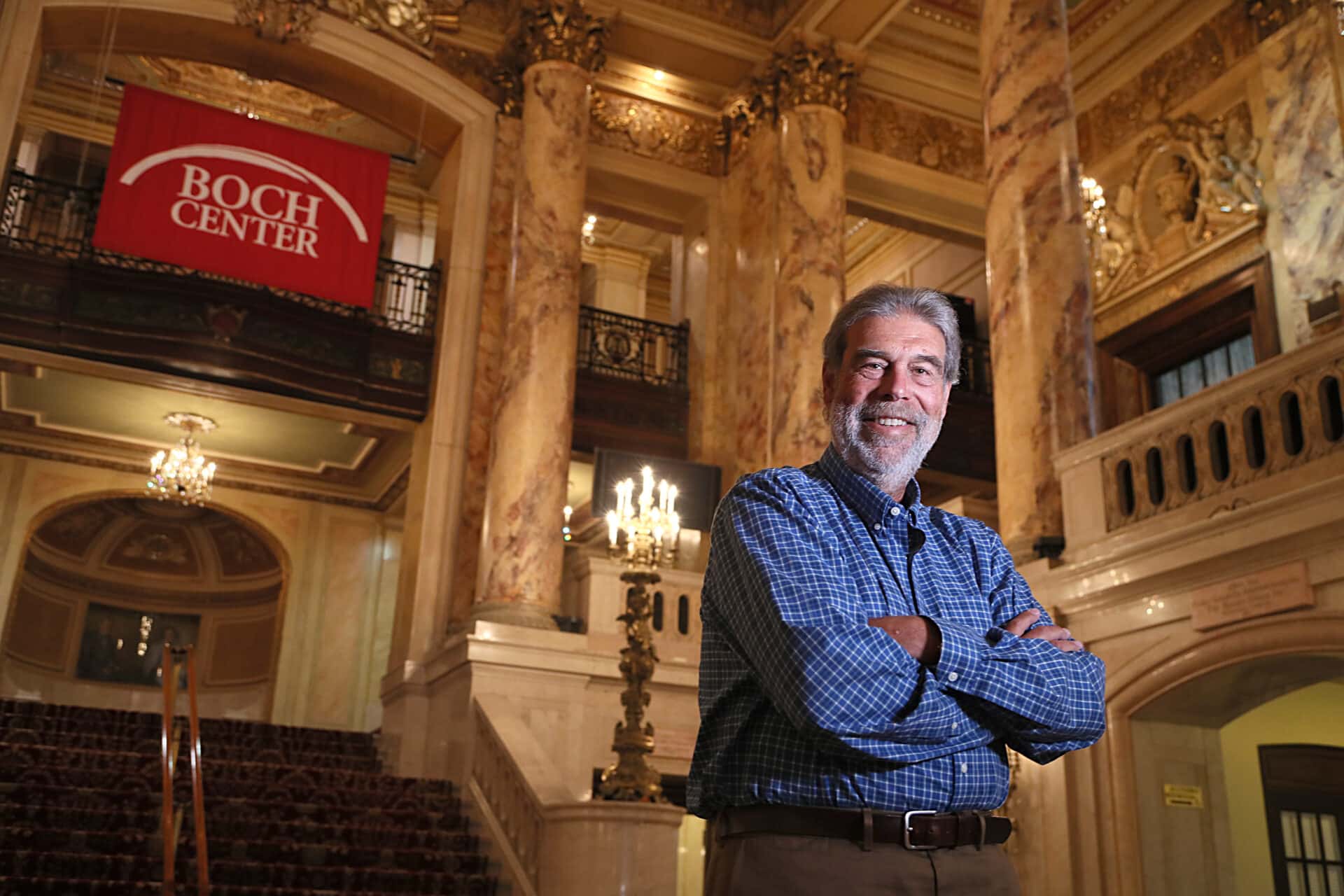
Boch Center CEO Joe Spaulding. (Getty Images)
“This is the absolute opposite of what happens with a music museum,” said McCloud. “Usually, you build the museum and then you have a small performance space off to the side. This is an incredibly historically important performance space that has embraced a museum as part of it. What an amazing way to reach so many artists when they come here to perform.”
Two areas are under development by McCloud and Santelli. One space has a garage band feel with white, cinder walls and a stairwell leading from the pit.
The room will have an electric band set up where patrons can get a tutorial and ask questions about guitars from a hologram from collector Ernie Boch Jr. McCloud wants to strike the right balance with items on display and draw patrons into the museum.
“We are using technology and augmented reality to tell the fullest possible story and encourage people to become part of the experience,” McCloud said.
The technology is cutting edge, but it’s the historic relics on loan from artists and their families that resonate with McCloud. “I just unpacked an item for the bluegrass case,” she said. “It’s (bluegrass pioneer) Everett Lilly, the Lilly Brothers’ family Bible.
“They influenced everybody and not that many people realize how important they were,” she said. “Everett would take notes and write scripture and lyrics and put all these pieces of paper in the Bible because he would know where to find them. These people should not be forgotten because time has passed.”
The items are secured and preserved with all the standard museum protocols set by the American Alliance of Museums including temperature and humidity controls and thick, bump-absorbing plexiglass, according to McCloud.
She said her personal favorite is Pete Seeger’s banjo. “He has a message on the skin of the banjo that says, ‘This machine surrounds hate and forces it to surrender,’” she said. “He carved the neck in 1969 and it doesn’t even have a strap, it has a rope. It is symbolic of Pete Seeger.”
Seeger’s timely message is central to Spaulding’s mission of a civilized society.
“If you get a good enough reputation, which we think we do, and the right players and the trust of the community, and the trust of the artists around this country and the world, I think people will pay attention,” Spaulding said. “FARHOF is a platform that embodies what we believe in.”
